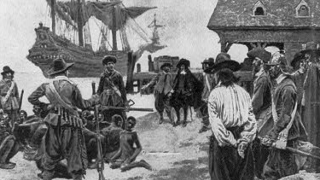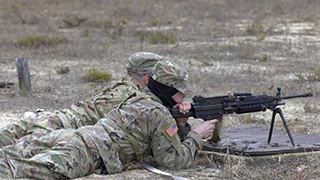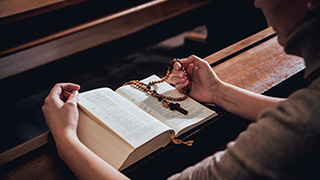1619: A Significant Precursor in Building the Foundation of America
Friday, August 23, 2019

Rev. Dr. Forrest Pritchett, Director of Special Projects, Freshman Studies; Dr. Martin Luther King Leadership Program.
Background:
On August 25, 1619, 20-30 enslaved Africans landed at Point Comfort, today's Fort Monroe in Hampton, Va., aboard the English privateer ship White Lion. In Virginia, these Africans were traded in exchange for supplies. Several days later, a second ship (Treasurer) arrived in Virginia with additional enslaved Africans. Both groups had been captured by English privateers from the Spanish slave ship San Juan Bautista. They are the first recorded Africans to arrive in England's mainland American colonies.
The landing of the first Africans in Virginia is one of the most significant events we interpret. Although English colonists in Virginia did not invent slavery, and the transition from a handful of bound African laborers to a legalized system of full-blown chattel slavery took many decades, 1619 marks the beginning of race-based bondage that defined the African American experience…. Hampton History Museum, Hampton, VA.
Rev. Dr. Pritchett reflects,
We, as Americans must take the time to study, understand, appreciate and interpret all the significant milestones in the American story, if we are to build a more empathetic future. We commemorate one of those significant events this August. Many people are totally indifferent to the story of the survival of Africans in the new world and lack any awareness of the length of their struggle through the indignities of slavery, the hope of reconstruction and the continuing atrocities in the twenty-first century.
Do most Americans have an understanding the role of slavery in the economic development of the American Empire and in building wealthy families and institutions? Do we appreciate the long struggle in American race relations that followed? Do we teach or acknowledge, that the seeds of that struggle, bore fruit for all Americans in the twentieth century, through the numerous civil rights laws? That movement continues in the twenty-first century with some new imperatives and a lot of unresolved “cultural business.
'The 1619 Project' of The New York Times Magazine is a significant contribution in this direction.
Stephanie James Harris, Ph.D., executive director, The Amistad Commission, NJ Department of Education, says,
At Jamestown, which is identified as the original site of the first permanent English settlement in what will become America, three cultures—indigenous Native Americans, European settlers, and the introduction of enslaved Africans--came together to lay the foundations of modern American society. It was a foundation of paradox, where the development of captivity amid democracy is revealed through the emergence of self-government, enslavement, Native dispossession. A full understanding of the events that commenced in that location form the basis of what all our students learn in our Social Studies classrooms across the nation.
Professor Kelly Harris, Chair Africana Studies, Seton Hall University elaborates:
An integral part of American culture is to use dates to understand different historical periods. This allows us to locate trends, be they of the progressive or regressive variety. This year marks the 400th year since the arrival of Africans at Jamestown. While this does not indicate the first time Africans stepped on the shores of North America – Africans sailed with Columbus and Africans were in St. Augustine as early as 1565. 1619 marks the beginning of African indentured servants and the seeds for chattel slavery.
It is important that the country, particularly its institutions of higher education, take a sober look at what 400 years has rendered. It should come as no surprise that the 400-year sojourn is marked with shocking atrocities as well as astonishing victories. Not only is American chattel slavery a unique phenomenon in human history but, more importantly, the resiliency and accomplishment of people of African descent in America has no equivalent in recorded history.
Let us take the time to learn, reflect, and act to make sure we learn from the past 400 years and move forward and reach unimaginable heights. We can interrogate the unique expression of the past 400 years in creative ways at Seton Hall. The literary and performing arts, the humanities, and social sciences all present interesting opportunities to assess this period. While the United States was built on chattel slavery it also witnessed the oratorical genius of Frederick Douglass, prophetic ministry of Dr. Martin Luther King Jr., soulful voices of Aretha Franklin, and Mahalia Jackson, and the unmatched bravery of David Walker, Harriet Tubman, Charles Sumner, and John Brown just to name a few. We can exhaust ourselves listing the names of men and women, of every race, class, gender, sex, and creed who have put it all on the line to transform this country from its ignoble beginnings. Seton Hall, as a University that embraces critical thought and moral practice, can do no less.
Professor Mary Balkun, Director University Faculty Development, Seton Hall University, states:
Given the diversity of our student body, as well as the increasingly diverse world for which we're preparing them, it's critical that faculty understand how their courses can contribute to the creation of an inclusive culture that respects diversity in all its forms. Our courses can be places where we acknowledge not only a diversity of voices in terms of content but also differences in our students that arise out of inequities based on race, class, gender, culture, and ability. We can and should structure our courses to enable students across the spectrum to succeed. But the first step is to be aware of those differences and the ways our courses may unintentionally contribute to exclusion rather than inclusion.
Rev. Dr. Pritchett continues:
I conclude by indicating that there are five reasons why the infusion of African American components and paradigms of American history into the study of history is important and should be taught and emphasized in the United States.
- Personal racism is still alive and well in America. Systemic racism must be identified and corrected;
- Teaching African American history or just talking about it, opens a two-way communication between children and college students, who are taught, and their parents and faculty who may have never been taught;
- There is more to African Americans than the negative stories and stereotypes seen and heard on television, movies and the news;
- Lack of cultural appreciation and respect leads to xenophobia both in the United States and around the world.
- Hatred leads to genocide.
"Freedom is never voluntarily given by the oppressor; it must be demanded by the oppressed."
"We all came in on different ships, but we're all in the same boat now."
— Rev. Dr. Martin Luther King, Jr.
Again, we are planning a moment of reflection and affirmation on Friday August 30 at 12:00 noon on the University Green. Please join us.
References and further reading:
New York Times' statement:
The 1619 Project is a major initiative from the New York Times observing the 400th anniversary of the beginning of American Slavery. It aims to reframe the country’s history, understanding 1619 as our true foundling, and placing the consequences of slavery and the contributions of Black Americans at the very center of the story we tell ourselves about how we are.
- The New York Times Magazine, "The 1619 Project," August 18, 2019.
- Jamestown Discovery
- Jamestown Evolution





